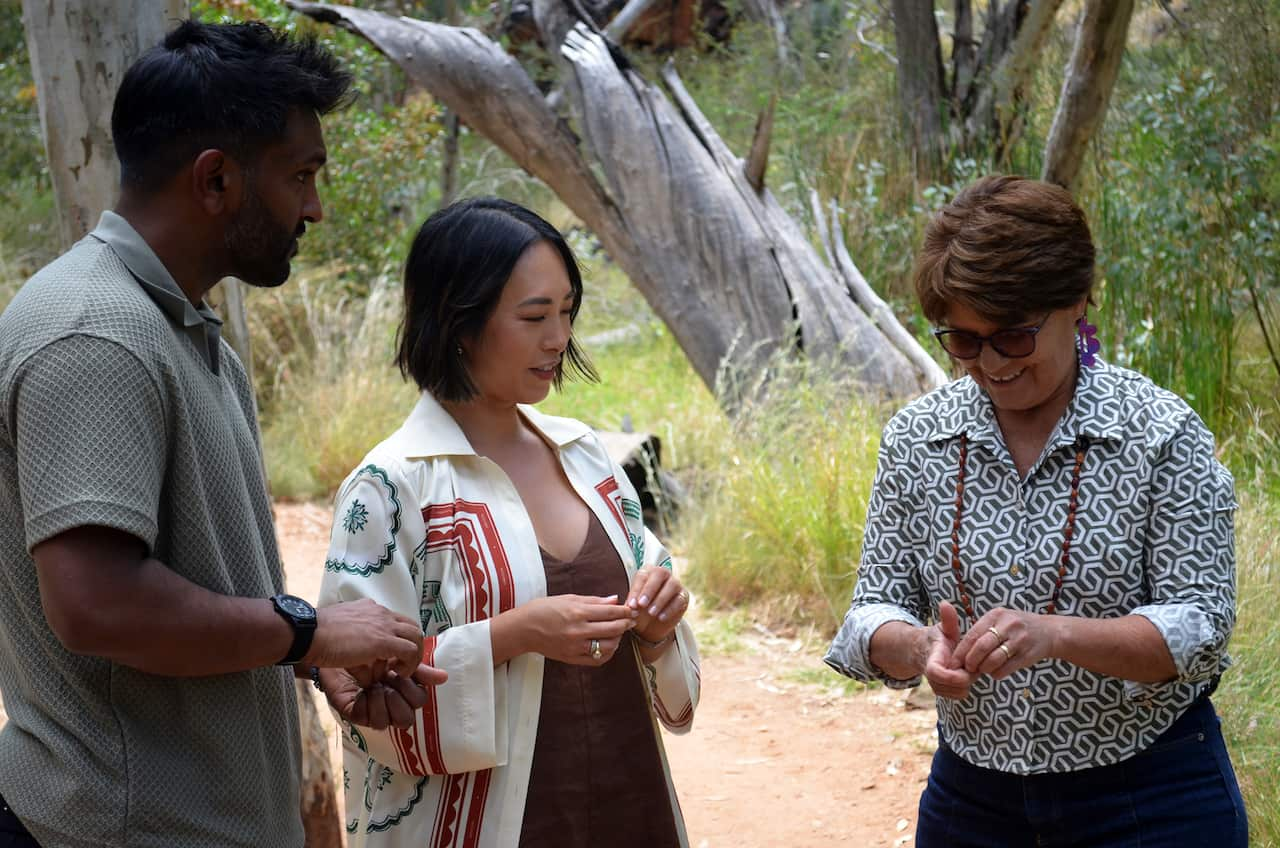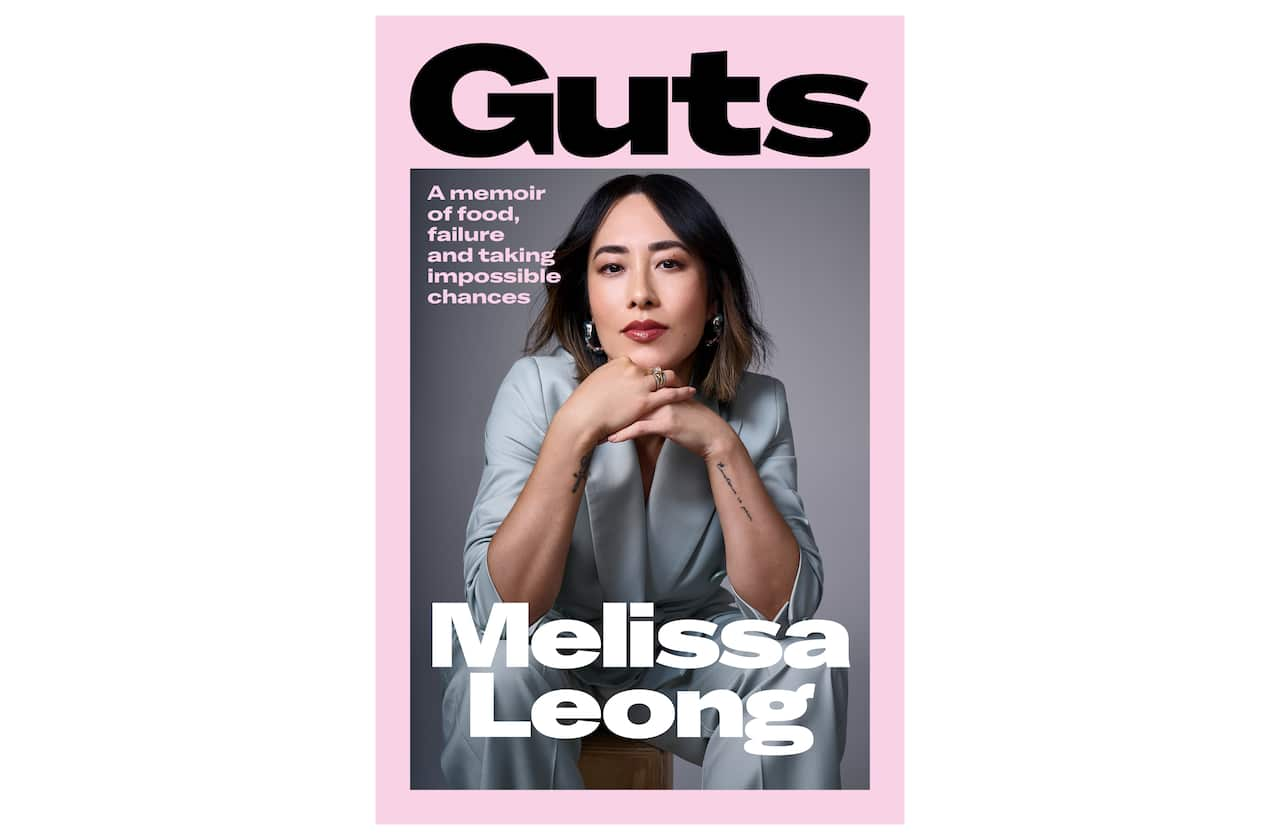Gold Logie-nominated TV host and writer Melissa Leong – most recently seen on SBS screens in Great Australian Road Trips and powerful documentary series The Hospital: In the Deep End – has written a brave, honest and gripping new memoir. In Guts, she shares the highs and lows, tackling themes including taking chances, facing racism, mental health, finding the courage to start over when things don't go according to plan, and of course, her love of food. In this extract, she shares how food has been a wonderful, and sometimes confronting, part of her life from the early days of childhood.
Even before food became a defining part of my career, it was a guiding light in my life. No Singaporean I know eats purely for sustenance. It is in our DNA to be obsessed and all-consumed by the romance of food. It is a glorious addiction, the indulgence and the rapture of a really good meal in all its sensorial glory. From a simple bowl of soupy noodles to an epic multi-course banquet, the thrill is pretty much the same: which is to say that the vibes are high all day, every day. Most of my earliest memories are of the sounds, the sights and – perhaps most powerfully – the smells of my family kitchen, and the pungent, enlivening aromas of the places my family went to buy the produce that ended up in that kitchen and eventually on our table. It isn’t merely the act of eating that fills me up; it’s also the ritual, process and practice of procuring, preparing and producing food for others that captures my attention and fills my heart with joy.

I have a clear memory of my own from when I was around four years old, in our family kitchen. On the squeaky laminate floor, designed rather unconvincingly to look like tiles of slate, my mother had carefully spread sheets of newspaper lifted from the local Chinese grocer. She had then placed her heavy stone mortar over the columns of Chinese characters communicating the news of the day and ads for cheap flights to various destinations in Southeast Asia. She sat on the floor in the afternoon light, pounding chillies, eschalots and other heady aromatic ingredients to make a spicy sambal. The rhythmic thumping of the stone pestle on spiced paste vibrated through the floor; I could feel it with my feet. Dust glittered within the shafts of sunlight streaming through the kitchen window, illuminating the fiery red hue of the paste as its individual elements came together as one. This labour-intensive process was just one of many that would create a dish to grace our dinner table that night. That meal marked no special occasion, yet in my mind the memory feels weighty, bathed in deep significance.
Other childhood food memories were… stinkier. On days when piles of dried shiitake mushrooms were sorted and soaked in pots of hot water, the earthy, pungent, sulphurous aroma permeated every pore and repelled us children out of the house until dinnertime. The magnitude of those mushrooms would be tamed when they were integrated into rich soy-braised meats, gingery steamed fish, and verdant vegetables lacquered in a gloss of oyster sauce and sesame oil. The symphony of aromas from our culture was anchored and balanced by those forceful little fungi. Our deep desire to escape was futile, because by the time we could smell those damned mushrooms, the foetid fragrance had already embedded itself deep into the fibres of our clothes, skin and hair. This was an invisible mark to the kids in the neighbourhood with whom we played; the kids from whom we, as the only non-Anglo family in the street, were different in so many more ways than simply appearance.
...those memories form a crucial part of the bedrock of not only my career, but also my life as a whole. Food wasn’t just sustenance, but a language we learned from birth – a way of communicating deep love...
It strikes me now that those memories form a crucial part of the bedrock of not only my career, but also my life as a whole. Food wasn’t just sustenance, but a language we learned from birth – a way of communicating deep love and affection in a culture that often finds it difficult to do so by way of a hug or even an ‘I love you’. To my knowledge, all Asian children are only allocated two ‘I’m proud of you’ statements a year, but don’t quote me on that. Similarly, issues of mental health are never discussed. My bouts of feeling low or anxious as a child were chalked up to ‘being moody’, and as a small human, I lacked the language to articulate further if anyone had thought to ask.
In my experience, many emotional things a Chinese parent wants to say, but can’t, are said with food. In my family, as with many, food was a reward. More than mere sustenance, it was a luxury, an incentive, a way of smoothing over a bad day. Most crucially, of saying ‘I’m sorry’, and that most elusive of all sentiments, ‘I love you’.
At my house, there were pots of pork bones braising with carrots, onion, ginger and garlic in broth until the meat barely clung on. The bones were fished out of each pot and drizzled with soy, a homestyle favourite thing to do at ours. Extra points if you got a piece with the marrow intact so you could push it out with a chopstick or a finger and slurp it up, its fatty plushness coating your lips with clinging richness.
No matter what the day brought, the woes of the world would stop in a mouthful of noodles rising like a charmed snake from a bowl of soup.
Whether home-cooked or eaten in one of many crowded restaurants filled with the squeals of children, the low hum of chatter in multiple Asian languages and dialects, and the tinkle of melamine chopsticks on porcelain bowls, food was the great escape from reality and the work to be done. No matter what the day brought, the woes of the world would stop in a mouthful of noodles rising like a charmed snake from a bowl of soup, the steam creating a fog of humidity around your face as you inhaled ginger, garlic, shallot, pork broth. Just one slurp made the world a better place.
When I was a kid … Sunday’s yum cha leftovers became an easy Monday lunchbox filler, and all morning I would think about which ones Mum had packed and what dumpling I’d eat first (I would always save my favourite till last). It was a battle of waiting until morning tea or lunch to eat them, but that battle also contained the dread that would come with my classmates playing my least favourite game: ‘What’s That Smell?’
I’ve come to realise that when kids do this, it’s usually coming from a place of uninitiated curiosity and not of pure disgust or hatred. Usually. Those unfamiliar fragrances were of my heritage and not theirs, though happily that’s changed a lot over the years as Australians have grown in their obsession with food of all cultures. I smiled recently when I read a school lunch menu stuck to the fridge door at a friend’s house – there was sushi on that menu! What?!
In cartoons, good smells are often depicted by a disembodied arm beckoning the characters closer. I can still smell that mixture of Tupperware plastic slowly baking in a backpack throughout the day and the waft of whatever was inside it the moment I popped the lid. In the playground, the cartoon finger of my lunchbox’s aroma lured my classmates over to peer into the trove of wonders packed by Mum, and I took great pleasure in explaining what I was eating. Sometimes I’d even let them try a bite if they wanted. (I am, by my own admission, a feeder. From a young age, I had already figured this out about myself.)
Sometimes, though, kids say hurtful things about what they don’t understand. My lunchbox was a daily source of happiness that did not contain Devon sandwiches, store-bought biscuits, or parched sticks of carrot and celery with nothing to dip them into. (Devon, for those who haven’t had the pleasure, is a sliced lunchmeat of indeterminate origin. In my career, I’ve become pretty good at being able to guess what goes into most things, but on this particular subject I remain mystified.) So sometimes that happiness came served with a side of unconscious racism, hold the tomato sauce. Inevitably there’d be a kid whose fear outweighed their curiosity, and instead of questions, I witnessed pinched fingers over noses or, worse yet, index fingers pulling up the outer corners of eyes in mockery of me.
My parents had chosen to settle in the heartland of Sydney’s Sutherland Shire, colloquially known as The Shire, home of Sylvania Waters, The Sharks and the Cronulla riots. Can’t say they weren’t committed to the full Aussie experience. But being Chinese at a primary school that only had one or two other Chinese families present meant we were conspicuous. It meant that we few carried every stereotype possessed by the Asian diaspora, like we were a single nation.
Chinese burns were an acceptable way for kids to hurt each other in the playground, and teachers would pretend not to hear ‘Ching Chong Chinaman’ being whispered when I’d walk past. That stuff stays with you long after you’ve left the playground. I remember a kid walking up to me, pressing a finger to my chest and calling me a Gook. Talk about point-blank racism, shots fired. I was so shocked, I think I walked away without saying anything. In a predominantly Anglo-Saxon school, the unspoken code was that ethnic kids would stick up for each other. I felt heartbroken that this Greek kid didn’t see fit to include me under that coloured umbrella of protection. It was then I realised that even among ethnic groups there was a hierarchy, and I wasn’t at the top of it. We were Gooks, Chinks, Chinamen and Ching-Chongs – and, apparently, dirty. I don’t think this last insult had to do with the fact that we are a shower-twice-a-day, wash-your-feet-before-getting-into-bed culture. Being excellent at maths and music didn’t help me prove them otherwise. To this day I think that if you’re going to be racist, I suggest you at least be specific or accurate about it.
Having had weird school lunches is a badge of honour I now share with so many others as adults. For some of you other weird lunchbox kids, it might have been dolmades, slices of cold cotoletta between focaccia, leftover curry and rice . . . We each have our particular trauma about it, so we’re bonded, okay? In an environment so culturally different to home, those lunchboxes held artifacts of identity, a reminder of who we are and where we come from.

This is an edited extract from Guts by Melissa Leong (Murdoch Books).
SBS Food is a 24/7 foodie channel for all Australians, with a focus on simple, authentic and everyday food inspiration from cultures everywhere. NSW stream only. Read more about SBS Food
Have a story or comment? Contact Us

